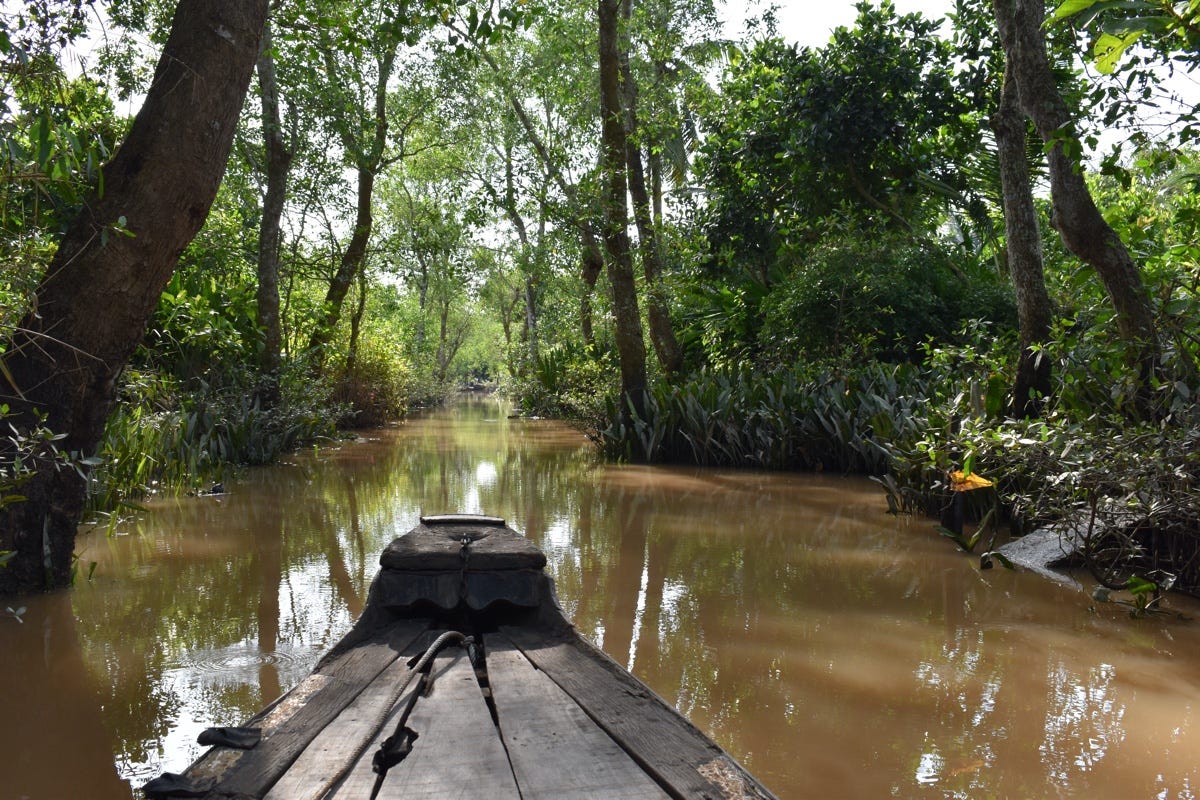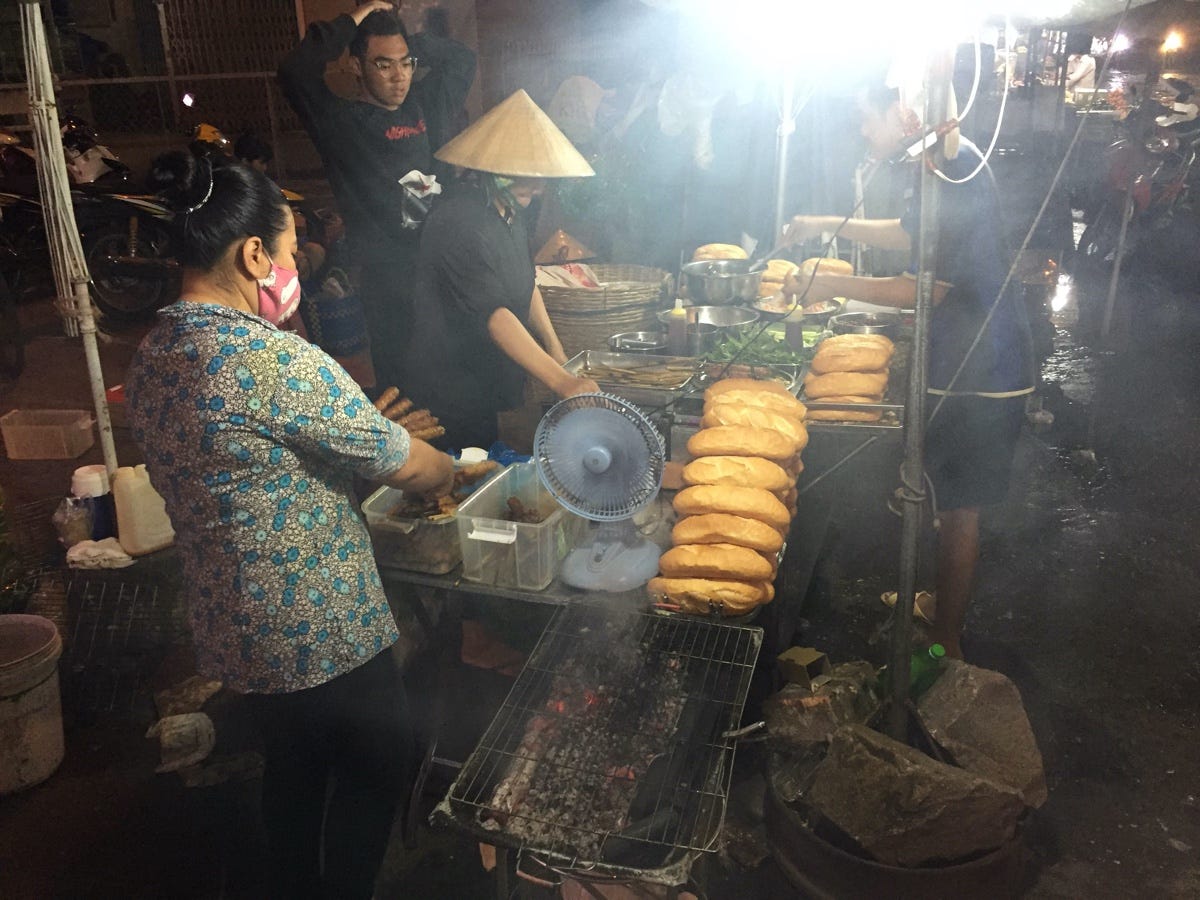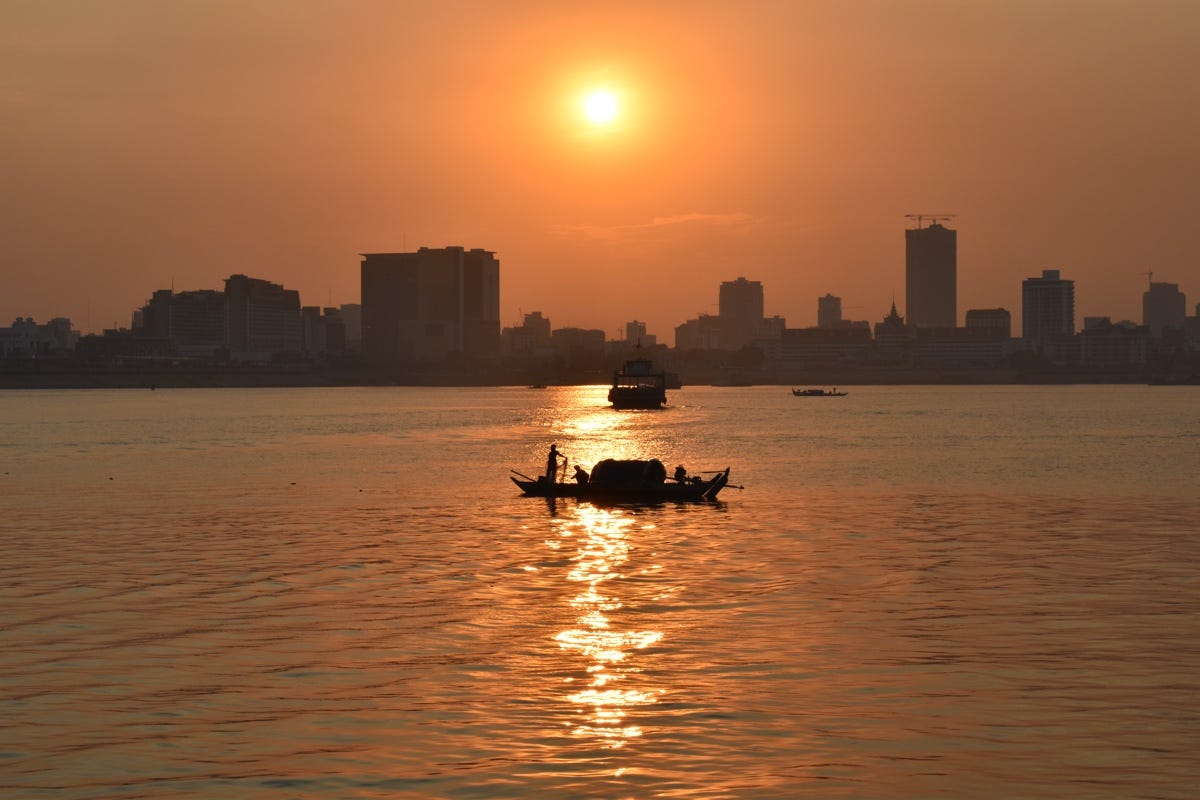Special Couchfish Christmas deal!
Try a free 7–day trial here, or get a year’s subscription for 50% off (so US$35 instead of US$70). Looking for a Christmas gift for a stuck at home traveller—what about a gift certificate?
Hi all,
On time! Small wins and all that! Tomorrow we should have our latest long read online. By Oliver Slow it takes a look at Chinese influence on Mandalay in Burma from centuries ago through to today.
If you’re new to this newsletter, you can check–in on our previous long reads, looking at Bali, Ko Pha Ngan and a UNESCO site in Malaysia. Our long reads are entirely funded by Travelfish supporters—thank you!
Just another swing through the Delta. Photo: Stuart McDonald.
On pay to read Couchfish, last week I was drawing towards a close on my time in the Mekong Delta. First a floating market, then a long day of eating in Vinh Long. Then, three posts, one on the challenges floating markets face, then two issues on Can Tho’s Cai Rang market.
You can see the entire Couchfish itinerary here—all 165 days of it!
What to readers say? This just in as I format the newsletter, Thanks A!:
“I have been reading these reports round the Delta and each time I read a new one, I keep thinking if only they had been available in 1993 when I visited.”
On free to read Couchfish, I took a meandering float up the Mekong. From My Tho in the Delta, to Xieng Kok in far northwest Laos, the Mekong delivers over and over. Enjoy!
If you’re not sold on Couchfish yet, try a free 7–day trial here, or get a year’s subscription for 50% off (so US$35 instead of US$70). Looking for a Christmas gift for a stuck at home traveller—what about a gift certificate?
As always, all the pics in this newsletter are from last week on Couchfish.
Hit me with four of those baguettes please. Photo: Stuart McDonald.
On David’s Thai Island Times, his weekly island wrap is well worth a read. Do check out the incredible photo of an unearthed whale skull—in, of all places, Samut Sakhon.
Also a plug here for a Cambodia focused newsletter I was recently switched on to (thanks Erin Cook!). Campuccino (I love the name) by Darathtey Din offers a regular wrap on all things Cambodia. It’s a great read for those Cambodia inclined, and, best of all, is free! So sign up and see what you think.
Today’s newsletter written from a Bali cafe, by the rice fields, in the pouring rain.
Good travels
Stuart
Travel in 2022
The other day someone asked me when I thought travel would restart. I answered their question with a question—what sort of travel? Like pre Covid19, came the reply. Not for a long time—if ever, I said.
Having a float around Cai Rang floating market. Photo: Stuart McDonald.
Later, I thought a bit more about what travel could look like. I picked 2022, as I don’t see mainstream travel coming back online in the next 12 months. It made for a depressing think session.
Without further ado, here’s my top 10 ways in which travel might present itself in 2022.
Please note: I hope I’m wrong.
All these assume an effective vaccine arrives, and is widely adopted by 2022. If not, add a year or three.
1) You’ll need to be vaccinated to board an international flight
Last week, the CEO of Qantas said they plan to mandate vaccinations for outbound flights. The outrage flew as fast as a fully–laden 747 taking off, but this is close to inevitable. The current system of PCR tests and quarantine is, and always was, a stop–gap measure.
Splish splash. Somewhere near Can Tho. Photo: Cindy Fan.
People will put up with a bargepole up their nose, but most will draw the line at 14 days of quarantine. While both are imperfect solutions, they’re the best countries can manage at the moment. FWIW I think quarantine should be before you get on a plane, but many think that is even worse than 14 days locked down in the destination
The other thing is, while the Qantas CEO stuck his head above the parapet, this won’t be left to private enterprise. It will become a government mandate. They’ll step in and demand that you need a vaccination to enter their country. Any carrier flying in or out will have no choice—nor will passengers.
Vaccinations are an imperfect science though, which brings me to point 2.
2) You will still need a PCR test within 7 days of flight
Vaccines are only so good. In the early years (not months) of vaccines being rolled out, the demand for a PCR test within 7–days will remain. Until a significant percentage of a population are vaccinated, the risk remains. What risk? The risk of a traveller bringing the virus in, and the risk of a traveller bringing it home. See this page for all the Perth bound flyers who were +ve.
3) Vaccine status & PCR date recorded in a smartphone app
In a shoebox in my parent’s house there’s a yellow vaccination book with my vaccination history. Paper? Rubber stamps? Sounds like Indonesian immigration!
I’m going to call the app the iCovid. There’s no particular Apple bias in this, it is just easier to type.
A wrap on wrappers. Photo: Cindy Fan.
If you want to travel, you’ll need a smartphone. You might not want one, but if you can afford an international flight, you can most likely afford a simple smartphone.
On your phone, you’ll need the iCovid app. It will record your vaccination status, and your last PCR test. It will also record which vaccination you have. I can see a rabbit hole of X country requires Y vaccine, but am not going there.
It is this app your airline will check before selling you a ticket or letting you board. Hell, you may even need to scan your phone to get into the airport.
Yes, I’m talking about an electronic health passport.
Read on before you say “This is nuts,” a few health passports are already in the pipeline. I expect they’ll be a shakeout at some stage and some UN agency or another acronym will run it. Anyone but Facebook or Google!
4) Vaccine & PCR required by immigration
This is a bit redundant for flight travel, but don’t expect land border crossings to be any different. No have, no enter.
You’ll swipe your smartphone app in a similar fashion to those ghastly QR code things. Not vaccinated, or without a PCR test in the last seven days? Bye bye.
5) Contact trace me
Yes, we’re getting into the paranoid tinfoil territory here.
As a vaccine rolls out, contact tracing will become even more important. The iCovid app will double as a contact tracing app, tracing your moves 24/7. This style of app is already in widespread use in Singapore and to a lesser extent in other countries.
Oh Phnom Penh. Photo: Stuart McDonald.
If you’re an inbound traveller, this will not be optional. The app will be accessible by the police, medical and immigration officers. Of all the points on my list, this is the one that concerns me the most—it is inevitable though.
6) Vaccine & PCR verification required by all OTAs to book any hotel, mass transport, tours
I started with flights and immigration as they’re the obvious choke–points. They lend themselves to mass surveillance and testing. How many airports now fingerprint you upon entry versus a decade ago? Where was the outrage about that?
The next choke–point is obvious: hotels.
As with flights, expect a government mandate. Depending on the country, hotels already report your details to the police. In some cases they also report you to immigration. In other cases still, to some dude in Bali’s Legian, who calls you at 3 am to try and sell you a villa.
Racing towards Pakbeng, Laos. Photo: Stuart McDonald.
The logical next step is to demand a swipe of your iCovid app upon check–in. Why? To confirm you are not a health risk to staff and/or other guests.
Online travel agents like Agoda, Airbnb and Booking will sniff a new revenue stream. They’ll access your vaccination status (via iCovid) before allowing you to book. Afterwards, they’ll charge properties for the effort. A buck a customer adds up fast.
7) Vaccine & PCR required for all visa processing
Want a visa? To anywhere? Can you scan your iCovid app there please? No vaccination? No PCR test? No visa.
8) Mandatory quarantine on +ve result
Through all this, some people will manage to catch Covid19 and test positive. For their efforts, a mandatory 14 quarantine—at their expense.
9) Flying will be expensive
In the transition period of the year or so while vaccines roll out, many low cost carriers will vanish. This has already started to happen.
Flying for less than the cost of a bus will no longer be a thing. Upside you won’t be sitting next to anyone. Downside, you’ll pay a lot more for your seat. Many will no longer be able to afford to fly.
10) Far fewer tourists.
Travel will become more tedious, more expensive and more restrictive. So it should not come as a surprise there will be fewer tourists.
And, if you care to look at the headlines of late 2019 about overtourism, this is a good thing—to a point.
Of the many downsides, welcome to the Surveillance State.
Big skies, great river. The Mekong from Pha Taem, Thailand. Photo: David Luekens.
On the upside, all these steps will go a long way towards protecting the health and well being of local people. Especially those working in the tourism industry. Local people should be paramount to all considerations about re–opening to tourism.
Within a Southeast Asian context, few enjoy the medical standards of foreign travellers. If the iCovid app came with a $10 charge, imagine the difference to health care some of that could make? Even ten percent put to healthcare, or sustainable community–based tourism schemes... The potential is wild.
When I tweeted a condensed version of these points, some felt I was being alarmist and negative. I don’t agree. Here’s why.
Earlier in the year I was on a TravelMassive panel discussing Covid19 and travel. One of the others on the panel was a venture capital guy, and he asked:
“What happens next time?”
His words stuck with me. Covid19 won’t be the last time some plague runs around the planet like wildfire—there will be more.
If a framework like the above had existed as a normal part of life in February 2020, would we still be where we are today?
Eating my way through Vinh Long. Photo: Stuart McDonald.
Despite all the above, personal privacy is something that is important to me. The whole surveillance state thing, as in Singapore, does my head in. That said, I don’t see a clear alternative. People have had their chance to consider the health of others.
I live in a country with over 500,000 cases and 15,000+ deaths—and those are the “official” figures. Many, wiser than me, believe the real numbers to be tenfold these. Despite this, tourists, expats, and some locals, refuse to self–quarantine and/or wear masks. In doing so, they risk the lives of those of far fewer means—and, to be selfishly honest, my own kids. I am over it.
Anyways, hope I’m wrong on all the above, but I fear not.
Good travels—wear a mask!
Stuart
Premium members only:
Book a round the world with roundtheworldflights.com (must travel from the UK via Asia, Australia, New Zealand AND the Americas) and get £30pp off your trip. Offer valid for departures to December 2021.
Log in to the Member Centre on Travelfish now for your coupon code and start designing your own round the world trip
Thirteen things worth reading
Life in Saigon during Vietnam’s pandemic peak
“If they can keep this mostly contained in the quarantine zones, I have faith this won’t get much worse, though leaders are warning of dire consequences if any mistakes are made.”
In Indonesia, paranormal activity banned as shamans clash
“He said he was bestowed with paranormal abilities after being born prematurely. ‘When my mother was pregnant with me and went for a check-up the technician told her that there was no baby in her womb, but a large snake instead. I didn’t meet my father until I was seven years old, as he was in prison, having beaten the technician to death,’ he said.” Oh Indonesia.
The Silk Road was more than a vast trade route
“Trade along the Silk Road continued for roughly two thousand years, waxing and waning at times as the territories it traveled through shifted hands.”
A feared law to protect the monarchy returns amid Thailand’s protests $
“In just a few months, Thailand has transformed from a country where criticism of the monarchy was only whispered to a place where protesters have spray-painted ‘the king is dead’ on Bangkok streets.”
Organic farmers begin to reap the fruits of their work
“But industry insiders said the organic farming industry in Vietnam still has a long way to go and companies need to invest more in perfecting their business model.”
Compensation delays for survivors of Laos’ worst dam disaster
“An official from the Labor and Social Welfare Department of Attapeu Province in charge of the budget for compensation told RFA that the allowances have been delayed because funding from the dam’s developers was late in coming to the province.”
A collection of illusory night scapes from 1938
“The photos may not reveal what happened in Saigon’s shadows, but they give a unique perspective on the city’s refulgent regions once the Earth has turned its back to the sun.”
Island broth: Bún Kèn
“A little bit of fresh red chilli ties all these flavours together.” YUM!
Myanmar Now editor suffered gunshot wound to leg
“We strongly believe that the shooting was meant as a threat aimed at discouraging Myanmar Now from confronting powerful interests with its journalism.”
"No-one’s wearing masks any more in Laos,"
An interesting podcast on what is happening in Laos during this age of Covid19.
“World’s loneliest elephant” Kaavan airlifted to Cambodia
“ ‘In the sanctuary in Cambodia … waiting for him is three ladies, three Asian female elephants,’ he said.”
Where to find the best pad thai in Bangkok
“Lucky for me (and you!), I discovered the actual place with the best Pad Thai in Bangkok. After realising that Thip Samai is only open in the evenings I did some extensive online research and struck gold: Pad Thai Lueng Pha.”
Cambodian visas during Covid19
“Keep reading for information on who is eligible, what the current requirements are for Cambodia visas right now, and what you’ll need to enter the country.”
Something to read
The Narrow Road to the Deep North
Sam wrote this short review a few years ago, but I’m just reading it now. She writes “While the story is about far more than the Thai-Burma Death Railway — think love, hope, humanity, memory — the setting of a Japanese POW camp along the railway looms large and dominates in this beautiful novel.” The novel is a great read.
Photo of the week
You’ve earned it. Photo: Cindy Fan.
Thank you!
Thanks from reading the Travelfish newsletter. Please feel free to forward it to all and sundry and your feedback, as always, is much appreciated.
Travel light!
Stuart & the Travelfish team













